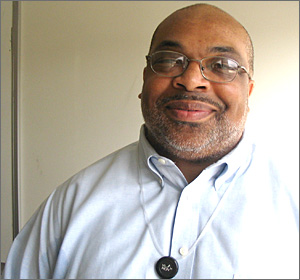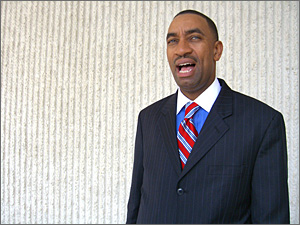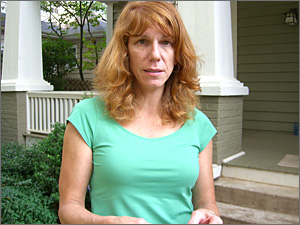|
People who attended West Charlotte High School from the mid-1970s through the 1980s recall deeply rewarding inter-racial experiences.
Tim Gibbs
 Tim Gibbs is raising much needed funding for his alma mater, West Charlotte High School.
Photo by Kate Ellis Tim Gibbs graduated from West Charlotte High in 1978.
West Charlotte had been a black high school during the Jim Crow years. When school integration came, many black schools across the South were closed, and their students were bused to white schools. But West Charlotte High stayed open.
Tim Gibbs is now a city planner. He believes attending West Charlotte after it integrated changed him and his friends.
"I think that the measure of desegregation's success was not what happened initially when the busing order was put forth," he says. "You look at things that have happened to us over the course of our lives, how none of us, really, we don't see color. And I think that's helped us to achieve the things that we've achieved in our lives is the fact that we don't see color. We treat everyone the same. We know that when the playing field is level and we've tried our best that things seem to go so much better for us."
A judge ordered Charlotte to stop busing a few years ago, and some of its schools have gone back to being nearly all white or nearly all black.
"I think what happened during integration, it was almost like there was this vine and it just kept growing," say Gibbs. "And it kept getting stronger. And what happened is somebody took a buzz saw to it and cut right through it."
Most of the students at West Charlotte today are African American. And a majority of. them are from low-income families. Test scores have dropped precipitously. Gibbs is trying to help raise money for the school and help students to be proud of being West Charlotte Lions
"What we're trying to do is actually just take a clipping from that former vine and plant it and hopefully it's gonna end up growing strong again. That's my hope for the school is that it will return to its former glory. … We always had a slogan when we were there: 'WC is number one and don't you forget it!' So now the slogan that's being used is 'Restore the roar.'"
James "Smudgie" Mitchell
 Charlotte City Councilman James "Smudgie" Mitchell encourages students at West Charlotte High School to look sharp and set their sights high.
Photo by Kate Ellis James Mitchell loves to talk about the years he spent at West Charlotte High. He graduated in 1980. "The mighty Class of '80!" he says. Mitchell is now a Charlotte City Councilman.
West Charlotte had been a black high school when James Mitchell was a child. In the 1970s, the district began busing white students there. To keep white kids from fleeing to private schools, the district made sure West Charlotte had advanced classes and lots of activities.
"I don't know if they wanted us to succeed though," Mitchell says. "I think that's where we proved them wrong. I really thought they thought it was going to be racial tension every day. 'Here we go again. Six o'clock news. A riot at West Charlotte again.' Never happened."
In fact, Mitchell points out, West Charlotte High integrated with so little trouble that students from Boston visited the school in 1974 to try to get some pointers. In Boston, busing was causing riots.
By the time Mitchell's class entered, he says black and white students were dancing and studying together and skipping class together.
"We never saw ourselves as black kids and white kids. At West Charlotte you were just WC," Mitchell says.
Mitchell says the two races got along so well in school that he was taken aback when he encountered racism outside school. He and several other West Charlotte grads told the story of a skating party in 1980. Players on the boys and girls basketball teams tried to go to a roller rink together, and the black students weren't allowed in.
"And here we were just walking down there, laughing, high-fiving, everybody wore knee pads 'cause we said we were gonna fall a lot. We were looking for a good time… And it was like, 'No, those can't come in.' It was like, oh. Okay. So, we're black. Okay."
The white students were outraged. And after they complained, authorities interviewed the students, and the skating rink was closed.
Mitchell says, coming from West Charlotte, he just wasn't expecting such a thing to happen.
"Maybe it gave me a false - I don't want to say false hope," he says. "Maybe it was a false environment. Because we got along so well, I really thought that when you would go out in greater society, people would embrace you. So we were in this safe haven, and you could see when we stepped outside … it smacked us right in the head."
Now that busing has ended in Charlotte, West Charlotte High has gone back to having a mostly-black student body, and the majority of the kids are low-income. Most of them qualify for free or reduced-price lunch.
"I been wanting my daughter to got to West Charlotte, and if you would ask me 20 years ago --'Oh no over my dead body, all my kids going to West Charlotte!'" says Mitchell. "But, reality, when I see the scores and the crime element is there, I got to be a parent and put my kid in the best situation. So I'm trying to change West Charlotte so when my 5th grader comes to 9th grade it can go back to the West Charlotte of old."
Alice Carmichael Pitzer
 Alice Carmichael Pitzer believes that people who attended West Charlotte High School in the 1970s and '80s are part of the luckiest club in America.
Photo by Kate Ellis In 1974, when Alice Pitzer was in 10th grade, she had to get on a bus and go to Piedmont High in Charlotte, NC. Piedmont had been a black school before integration. Alice Pitzer didn't want to go. She would have preferred to go to a private school, and her parents could have afforded it. But "my parents were people that believed in desegregation, very strongly," she says.
She says the students bused to Piedmont figured they were part of an experiment:
"Take a school that was traditionally black, and therefore traditionally under-funded, teachers that weren't great, and poor facilities, and bring in white students from a higher socioeconomic level, and somehow magically the school will improve.
"But nothing else changed," she says. "They didn't change the facilities, they didn't change the teaching or the materials, and the opposite happened. We went over there and we basically became juvenile delinquents for a year."
Alice Pitzer is now a lawyer. She says she'd always been a good student, but she started skipping classes at Piedmont. She remembers one day when there was an event to show the school off to parents and the community.
"And we thought, what a joke," she says. "This place is a joke. And so we all got together and arranged at a certain time to flush all the toilets at once."
She pauses and says, "I hope the statute of limitations has expired."
Because, she says, when the kids flushed the toilets, the pipes burst and there was water everywhere.
"We basically tried to destroy the school," she says. "That's how we felt about the school and the fact that we were there. And it wasn't because we were in school with black people or people we didn't know. It was that we got there and the teachers were horrible. It was a complete joke."
But Pitzer says her attitude changed when she went to West Charlotte High. West Charlotte had been a black school, too, but the district poured resources into it to deter white students from fleeing to private schools.
Pitzer says people who graduated from West Charlotte "all feel like we're part of the luckiest club in America," not just because it was a good school but because relations between the races were good. Black and white students became friends.
The first semester she was there, students from Boston visited West Charlotte High to try to find out how the Charlotte students were managing to integrate their school so peaceably. There were riots in Boston.
Pitzer remembers the day the students came.
"My real strong recollection at that time is the sense that we had, right or wrong, that the school board wanted it to fail, that there were people out there in the community that wanted that day to not be successful."
But Pitzer says the students made sure nothing went wrong. "You know, we were high schoolers and our rebellion was in showing them that this can work. This is not going to fail."
Pitzer remembers black and white students at West Charlotte playing on the same teams and doing the bump together at dances. But she says they didn't socialize much outside of school.
"I think that's where it ended," she says. "At the end of the day we got on the bus, we went home and everybody went their separate ways."
Still, she says she thinks going to a desegregated high school mattered, "because without it, everything would be separate.
"We could have stayed in our very comfortable existence and gone about our business and not had that experience, but … we wouldn't have some sense that perhaps that there is a reason for diversity and there is a meaningfulness to it."
Pitzer adds, "In a perfect world we wouldn't have gotten on a bus. It would be a neighborhood school because we would all live in the neighborhood and we'd all go there and it wouldn't be an issue. But of course we didn't live in that perfect world and still don't. But I still think it was better than nothing at all. "
More Voices from the Desegration Era
| 


